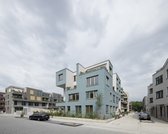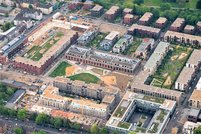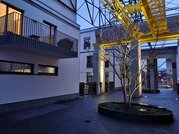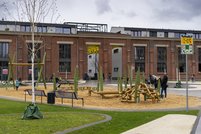CLOUTH.
Partner city: Cologne
50733 Köln
The Rheinische Gummiwarenfabrik, founded by Franz Clouth, wrote Cologne's industrial history for almost 140 years before production was shut down in 2005. The city of Cologne acquired the 14.5-hectare site between Niehler Strasse and Johannes-Giesberts-Park in Nippes and launched an urban development competition. The objective was to turn the formerly industrial site into a new, valuable piece of the city: the Clouth neighborhood.
read moreCLOUTH. is sustainable thinking: land recycling enabled a sustainable and contemporary redensification of the Nippes district, close to the city center, with living space for over 3,000 people, around 500 jobs and a healthy infrastructure.
CLOUTH. is responsible action: Many stakeholders built a new neighborhood together. All investors and building groups were involved in competition procedures to secure and diversify architectural qualities. Exceptional architectural monuments were renovated and bring history to life. New offers tie in with existing structures in Nippes and complement them with innovative concepts.
CLOUTH. is ecologically greened through and through: from gray to green: the former industrial wasteland has been unsealed, the soil remediated and turned into a greened-through neighborhood with tree-lined axes, public playgrounds and open spaces, private and semi-public gardens. Pedestrian and bicycle paths close gaps in the trail network to bring the neighborhood and park together.
CLOUTH. is socially planned: The new neighborhood thrives on the diversity of all those who live and work there. Characteristic features are the stable social mix and the abundance of living concepts. The neighborhood square, where the paths cross, forms the common green center of all projects.
Facts and figures
- Owner: moderne stadt
- Site area: 14.5 ha
- Total number of apartments: 1,250, of which 30% subsidized housing
- Building groups: 100 residential units
- Total number of jobs: approx. 500 jobs
- Completion date: 2023
- Design and outline planning: scheuvens + wachten, Dortmund





